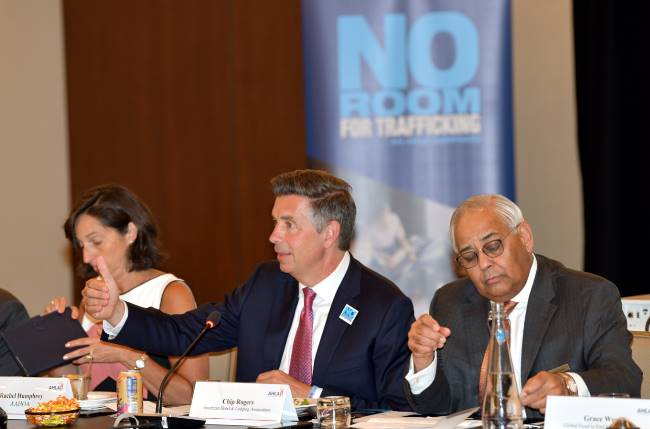According to American Hotel and Lodging Association (AHLA) president and CEO Chip Rogers, its newly launched national campaign ‘No Room for Trafficking’ seeks to unite the industry around a single, comprehensive approach to fighting human trafficking. AHLA kicked off the campaign this week at a strategic roundtable bringing together industry leaders, government partners, law enforcement, and national trafficking prevention partners to underscore the industry’s efforts around human trafficking. Rogers and representatives from two of AHLA’s national prevention partners—End Child Prostitution and Trafficking (ECPAT-USA) and Polaris—described the problem and efforts to fight it.
“No Room for Trafficking sends a loud and clear message: We will not tolerate human trafficking in the hotel industry,” said Rogers, who noted that the industry had a strong record of combatting trafficking and supporting survivors, but that it needed to do much more in terms of training and education to make a real difference.
As Rogers noted, because trafficking networks often rely on legitimate businesses—many in the tourism supply chain—to sustain their illicit and illegal operations, hoteliers are uniquely positioned to identify and disrupt this practice, and can therefore play an important role in combatting trafficking through raising awareness, improved coordination with law enforcement, and ongoing workforce training.
Toward that end, the No Room for Trafficking campaign outlines four core pillars to bring the hotel industry together and build upon current efforts:
- Elevate issue awareness through increased education, resources, and training for all hotel employees;
- Assess protocols, procedures, and technologies to confirm training effectiveness and employee vigilance;
- Educate by developing strategic intervention and disruption strategies to identify and report suspected trafficking situations; and
- Support by furthering partnerships with leading national human trafficking and law enforcement organizations to establish industry standards and support survivors.
As part of the campaign, AHLA is providing new resources and materials for members, including:
- An action plan for hoteliers to implement that includes training staff on what to look for and how to respond; displaying human trafficking indicator signage; establishing a companywide policy; ongoing coordination with law enforcement; and sharing success stories and best practices.
- A companywide anti-trafficking policy template for members who may not already have a policy in place that incorporates key elements and recommendations from AHLA partners ECPAT-USA and Polaris.
- Strategic partnerships with leading national prevention partners, including ECPAT-USA, Polaris, Businesses Ending Slavery and Trafficking (BEST), SafeHouse Project, the D.C. Rape Crisis Center, the National Center for Missing and Exploited Children, and others.
- A member resource guide that provides information on ways to implement the AHLA action plan, including where to access employee training and partner resources, downloadable signage, strategies to connect with law enforcement, ways to report instances of trafficking, and how hotels can support survivors.
Michelle Guelbart, ECPAT-USA director of private sector engagement, said, “Our vision is for a world in which no child is bought and sold or used for sex.” She added runaways who are isolated from friends and family are at especially high risk for exploitation. “Of more than 23,000 endangered runaway children reported to the National Center for Missing and Exploited Children in 2018, one in seven were likely victims of child sex trafficking.” Noting that these young people may feel they have little opportunity to ask for or be offered a way out, she said hotel front-desk clerks, in particular, can be trained to identify them.
On this point, Elaine McCartin, corporate partnerships and training manager for Polaris, said, “We need to build on this campaign to ensure that employees remain vigilant and have a deep understanding of the most-up-to-date indicators of trafficking.” She maintains, too, that making traffickers aware that hotel employers have this deep knowledge to identify and report crime is a powerful deterrent. She mentioned the national hotline number that enables employees to report instances of suspected human trafficking when faced with suspicious behavior. “This a toll-free, confidential hotline that provides victims and survivors of human trafficking with critical support and resources to get the help they need 24/7, every day of the year.”
By partnering with local, state, and federal law enforcement, including the U.S. Department of Homeland Security’s Blue Campaign, AHLA is working to bring together law enforcement and government officials to expand currently established relationships. The association continues to broaden educational resources to address employee and guest safety with national organizations that target sexual violence, sexual assault, and trafficking and promote workplace safety, including ECPAT-USA, Polaris, BEST, National Sexual Violence Resource Center, National Alliance to End Sexual Violence, DC Rape Crisis Center, National Domestic Violence Hotline, Peace Over Violence, RALIANCE, RAINN, Safe House Project, and National Center for Missing and Exploited Children.











